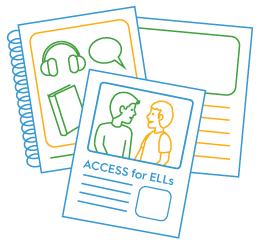Resources/Recursos
Featured Resources



All resources/Todos los recursos
Filter resources by:
Resources/Recursos
Adopting a Language-Focused Approach to Transitions Across PreK-3 Settings
This concept tool provides an overview of equitable, language-focused approaches to multilingual children’s transitions across programs, districts, schools and grade levels (PreK-K, K-1, 1-2 and 2-3).
See the Teaching in PreK-3 page for context.
Resource Details View Download NowReleased January 2023
Supporting Multilingual Learners' Language Growth Through Language Development Portfolios
This Focus Bulletin illustrates how teachers and students can use language development portfolios to interpret and document language growth. The bulletin follows the story of how a grade-level team introduced portfolios to their practice, posing several questions the team asked as they refined their usage. It closes by offering two sample tools that teachers can use and adapt to capture multilingual learners’ language growth using modified Proficiency Level Descriptors (PLDs) from the WIDA English Language Development Framework, 2020 Edition.
Published: December 2022
Authors: Fernanda Marinho Kray, Margo Gottlieb, Lynn Shafer Willner
Released December 2022
Justicia social a través de políticas educativas
En este boletín de enfoque, WIDA reseña las leyes y políticas que moldearon la educación del lenguaje en los EE. UU. Este documento presenta consecuencias inesperadas de estas políticas en los programas y la enseñanza de estudiantes bi/multilingües; destaca cómo practicantes en el ámbito educativo lidian con las políticas y sus consecuencias; e incluye herramientas para la reflexión, colaboración, capacitación profesional y relaciones comunitarias.
Detalles del recurso Ver Descargar ahoraReleased November 2022
Educational Justice Through Policy
In this Focus Bulletin, WIDA revisits landmark legislation and policies that shaped language education in the U.S. It presents unintended consequences on programming and instruction of bi/multilingual students; showcases how field practitioners address language policy and its consequences; and includes tools for reflection, collaboration, professional learning and community engagement.
Published November 2022
Author: Mariana Castro
Released November 2022
Scaffolding Learning for Multilingual Students in Math
This WIDA Focus Bulletin provides examples of specific macro-scaffolding and micro-scaffolding practices in action in a math classroom and includes guidance for developing these scaffolding practices over time.
Published November 2022
Authors: Jen Daniels, Ruslana Westerlund
Released November 2022
Gathering and Reflecting on Families’ Language and Cultural Goals
This WIDA Snapshot focuses on how you can gather information and reflect on the language and cultural goals families have for their children.
Resource DetailsReleased November 2022
Recaudando y reflexionando sobre los objetivos lingüísticos y culturales de las familias
Este resumen informativo se enfoca en cómo puede recaudar información y reflexionar sobre los objetivos lingüísticos y culturales que las familias tienen para sus hijos/as.
Resource DetailsReleased November 2022
Making Connections (Washington)
Making Connections: Using the Washington State Early Learning and Development Guidelines and WIDA Early Years Resources to Plan Instruction for Young Multilingual Children is a comprehensive resource that offers suggestions, tools, and sample plans for teachers who use the Washington State Early Learning and Development Guidelines and WIDA resources to plan equitable learning opportunities for young multilingual children.
Resource Details View Download NowReleased September 2022
WIDA MODEL Flyer
Are you looking for an interim ELP assessment to predict student performance on ACCESS for ELLs? This flyer provides information on why you should try WIDA MODEL.
Resource Details View Download NowReleased August 2022
WIDA ELD Standards Framework, 2020 Digital Explorer
This website serves as a digital database of the WIDA English Language Development (ELD) Standards Framework. It categorizes Language Expectations in two ways: by ELD standard statement and grade-level cluster, and by Key Language Use and communication mode. Proficiency Level Descriptors (PLDs) can be explored by grade-level cluster and communication mode.
Resource DetailsReleased August 2022
Engaging with Families of Young Multilingual Children
This WIDA Snapshot is grounded in WIDA’s ABCs of Family Engagement and can be used to initiate reflection and conversation on local efforts to engage with families of multilingual children.
Resource DetailsReleased August 2022
Enlazándose con las familias de niños multilingües
Este resumen informativo está basado en el ABC (por sus siglas en inglés) de la participación familiar de WIDA y puede usarlo para iniciar la reflexión y la conversación sobre los esfuerzos locales para el enlace con las familias de niños multilingües.
Resource DetailsReleased August 2022
ACCESS for ELLs: Entendiendo el puntaje de su niño
Envíe este volante a los hogares con los estudiantes, junto con el Informe individual del estudiante de ACCESS for ELLs. Este folleto provee información sobre cada aspecto de la puntuación incluida en el informe. Utilice esta guía en español para ayudar a los padres a comprender qué significan las puntuaciones y cómo se utilizan.
Detalles del recurso Ver Descargar ahoraReleased July 2022
Using ACCESS for ELLs to Promote Beneficial Outcomes for English Learners Flyer
This flyer provides a breakdown of the role school/district-level educators, state-level administrators and WIDA play in using or developing ACCESS Online and Paper test scores, interpreting scores and making decisions based on scores to best serve English learners. Plus, there’s a checklist outlining the positive and intended outcomes of using ACCESS Online and Paper scores, so you’ll always know what it takes to ensure your students have the supports they need.
Resource Details View Download NowReleased July 2022
Learning Language Every Day: Activities for Families (Ukrainian)
Activities to start conversations with children about their family, what they like to play, how they feel, what sounds they hear in their home or community, and the weather.
Resource Details View Download NowReleased July 2022
Family Connections Through Home Languages (Ukrainian)
This Ukrainian-language flyer provides educators with information on how home languages play an important role in maintaining communication and relationships with family.
Resource Details View Download NowReleased July 2022
Making Science Multilingual: Supporting Equity Through Design Principles
This Focus Bulletin emphasizes how multilingual learners' everyday language can be an asset to science teachers in their efforts to promote classroom engagement. It provides educators with real-world examples and guiding questions to help create learning spaces where sensemaking, co-construction, language development and equity can flourish simultaneously.
Published June 2022
Authors: Rita MacDonald, David Crowther, Jennifer Wilfrid
Released June 2022
Guiding Principles of Language Development Bibliography
Complete list of references cited in the WIDA Guiding Principles of Language Development.
Resource Details View Download NowReleased June 2022
Young Multilingual Children in Pennsylvania
In this study, completed for the Pennsylvania Office of Child Development and Early Learning, we explore the perceptions, experiences and decision-making of 13 parents of young multilingual children, ages birth to 5 years. The focus revolves around children’s language learning and development, family engagement practices and children’s participation in early care and education (ECE) programs.
Published 2020
Resource Details View Download NowReleased May 2022
Embedding the Can Do Cycle Throughout the School Year
This Focus Bulletin reframes the WIDA Can Do Philosophy as a can do cycle of actions that can be embedded into teaching and learning experiences throughout the entire school year. In it, we offer resource banks of questions that can be used to elicit student assets and reflect on ways to build on student assets at the beginning of each unit, during each unit, and at the end of each unit.
Published April 2022
Authors: Maya Martinez-Hart, Christina Nelson
Released April 2022




